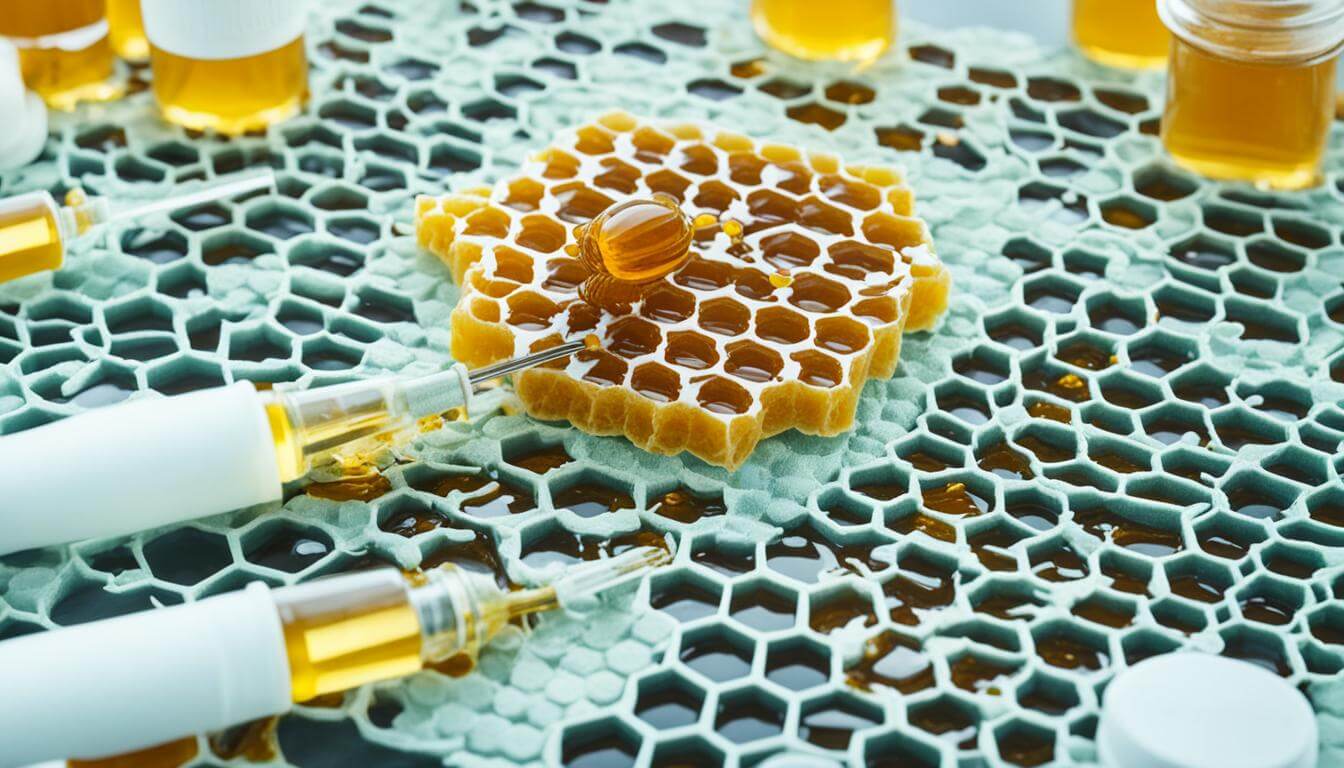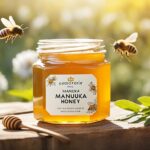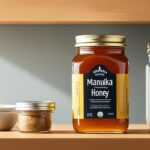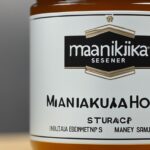Amidst a world brimming with technological marvels and synthetic solutions, could a natural remedy like Manuka honey be the unsung hero of modern healthcare applications? Long revered by ancient civilizations for its medicinal qualities, Manuka honey is making a triumphant return to the forefront of alternative medicine, challenging our contemporary understanding of wound healing and immune system support.
From the pastoral landscapes of New Zealand to the bustling corridors of clinics worldwide, this golden elixir is not merely a kitchen staple, but a beacon of potential in natural health options. By diving into the substance’s rich history and present-day acclaim, we uncover its pivotal role in healthcare—balancing traditional knowledge and cutting-edge science. Join us as we explore how this powerhouse of nature’s pharmacy can sweeten the prospects of holistic well-being.
Understanding Manuka Honey: Origin and Unique Properties
The story of Manuka honey begins with the New Zealand Manuka bush (Leptospermum scoparium), which is indigenous to the unspoiled landscapes of New Zealand. This bush blossoms with small white flowers that attract bees, resulting in the production of Manuka honey, renowned for its unique Manuka factor (UMF). Not all honeys are created equal, and Manuka honey’s distinguishing feature is its potent bioactive properties, backed by rigorous scientific research endorsed by the UMF Honey Association.
Unlike typical honey, the UMF is a global standard used to measure and ensure the quality of Manuka honey. It indicates the presence of key signature compounds such as methylglyoxal, dihydroxyacetone, and leptosperin, which contribute to the honey’s healing properties. This table compares the unique attributes of Manuka honey with regular honey, shedding light on its special characteristics:
| Attribute | Manuka Honey | Regular Honey |
|---|---|---|
| Origin | New Zealand Manuka bush | Diverse flowers and plants |
| UMF Rating | 10+ to 25+ indicating higher quality | Not applicable |
| Healing Compound | Methylglyoxal (MGO) | Hydrogen Peroxide |
| Antibacterial Strength | Superior due to UMF | Variable and less stable |
| Usage | Therapeutic applications | Culinary and some medicinal uses |
Understanding the Manuka honey origin and its high UMF rating is essential for consumers seeking a natural remedy with proven efficacy. The bioactive compounds uniquely present in Manuka honey, derived from the nectar of the New Zealand Manuka bush, provide health benefits that surpass those of regular honey, making Manuka honey a precious resource in both traditional and modern healthcare practices.
The Therapeutic Benefits of Manuka Honey
The renowned antimicrobial properties of Manuka honey have made it a highly prized substance in the realm of natural remedies. With an increasing number of studies substantiating its therapeutic benefits, we discover a plethora of ways this unique honey can support overall well-being. Notably, its role in promoting digestive health and its anti-inflammatory effects have emerged as significant advantages for those seeking holistic health solutions.

Not only does Manuka honey offer a soothing sensation for sore throats and persistent coughs, but its efficacy as a prebiotic also contributes to the maintenance of a balanced gut flora. Here are some of the key therapeutic applications that illustrate the versatility of Manuka honey:
- Improvements in Digestive Health: Regular consumption of Manuka honey is believed to alleviate discomfort associated with digestive disturbances.
- Prebiotic Support: Serving as a prebiotic, it nurtures the beneficial bacteria in the gut essential for optimal digestion and absorption of nutrients.
- Soothing Sore Throats: Its powerful antibacterial properties can help in reducing inflammation and mitigating infection.
- Assistance with Cough Management: The viscosity of Manuka honey coats the throat, offering relief from coughing while its antimicrobial properties help to manage the underlying irritation.
- Anti-Inflammatory Properties: Systemic inflammation can be addressed due to the bioactive compounds in Manuka honey that contribute to reducing redness and swelling.
With public and scientific interest continuing to burgeon, Manuka honey’s place in healthcare appears to be more than just a sweet addition. It’s a powerful ally in the fight for better health, naturally.
Manuka Honey in Healthcare: Clinical Evidence and Case Studies
As modern medicine seeks to integrate more natural healing agents, Manuka honey has emerged as a potent candidate backed by substantial clinical evidence. Research into Manuka honey’s wound care applications have demonstrated remarkable antibacterial effects, often influential in managing wounds that are otherwise resistant to treatment. Below we discuss several Manuka honey case studies that illustrate its efficacy in real-world clinical scenarios. These case studies reflect a growing respect for this natural remedy’s role within medical communities.
Case Study Highlights:
- A 2017 study assessing the impact of Manuka honey on chronic wound infections revealed a significant reduction in wound size and infection levels after topical application.
- Analysis of Manuka honey’s use in burn treatment documented not only quicker wound healing but also a notable pain reduction for the patients involved.
- Diabetic ulcers, a typically challenging condition due to impaired healing, have seen improved outcomes with Manuka honey as an adjunct to traditional wound care practices.
These instances exemplify a consistent pattern of successful outcomes when integrating Manuka honey into treatment protocols. For a more structured review, consider the following table summarizing key aspects of each case.
| Condition | Treatment with Manuka Honey | Outcome | Notes |
|---|---|---|---|
| Chronic Wounds | Topical application | Reduction in wound size and infections | Particularly effective against antibiotic-resistant strains |
| Burns | Topical application, used as a dressing | Accelerated healing, reduced pain | Promotes moist wound healing environment |
| Diabetic Ulcers | Topical application in conjunction with standard treatments | Improved healing rates | Supportive treatment that complements traditional methods |
Concluding from these verified experiences, it’s apparent that Manuka honey’s clinical applications extend beyond mere anecdotal evidence. Its capacity to address complex wound care challenges makes it a valuable component within the medical field’s arsenal. As such, continued exploration and documentation of Manuka honey’s medical potential remain a significant priority for healthcare professionals aiming to leverage natural remedies for enhanced patient care.
How Manuka Honey is Revolutionizing Natural Remedies
As consumers increasingly turn their attention to wellness, the conversation inevitably turns to the innovative alternative remedies that are changing the landscape of health product trends. Among these, Manuka honey has emerged as a stellar performer, particularly within the natural skincare domain. With its unique properties and multifaceted benefits, Manuka honey is becoming a staple ingredient in natural remedy formulations, catering to a market craving for organic and effective health solutions.
With a deep respect for time-honored remedies, consumers are drawing a direct line between the quality of natural ingredients and the integrity of their skincare regimens. Manuka honey is leading this trend with its remarkable natural purity and effectiveness, earning it a spot in the vanity cabinets of health-conscious individuals.
| Health Product Trend | Benefits of Manuka Honey | Applications in Skincare |
|---|---|---|
| Eco-Friendly Skincare | Sustainable, chemical-free alternative | Face masks, creams, and cleansers |
| Anti-Aging Formulas | Antioxidant-rich, supports skin’s natural elasticity | Serums and moisturizers |
| Acne Solutions | Antibacterial and anti-inflammatory properties | Spot treatments and toners |
| Moisture-Rich Products | Hydrating, promotes skin’s moisture retention | Day and night creams |
| Sensitive Skin Soothers | Gentle, reduces redness and irritation | Cleansing balms and soothe masks |
In essence, Manuka honey is not just another passing health fad but a significant natural health ally with roots digging deep into the future of skincare. As we continue to see this golden treasure from New Zealand’s shores make its way into innovative alternative remedies, one can expect that the surge in natural skincare solutions will only become more pronounced.
- Holistic Skincare: Integrating Manuka honey into whole-body wellness routines.
- Organic Certification: Ensuring Manuka honey used in products is sustainably sourced and certified organic.
- Beauty from Within: Supplementing with Manuka honey to promote skin health internally as well as externally.
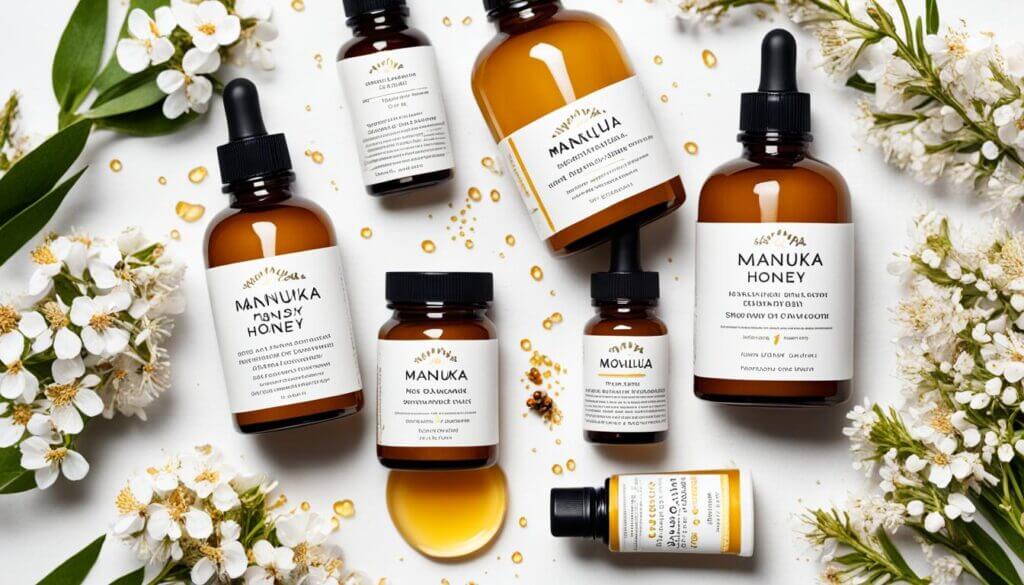
Comparative Analysis: Manuka Honey vs. Traditional Antibiotics
In recent years, antibiotic resistance has escalated into a global health crisis, creating an urgent need for natural alternatives to antibiotics. One promising solution emerging from Manuka honey research is its potential use as a complementary or alternative medical intervention. This section delves into a comparative analysis between the therapeutic properties of Manuka honey and traditional antibiotics.
Manuka honey is celebrated for its unique antibacterial properties which, unlike conventional antibiotics, do not contribute to the development of resistant strains of bacteria. Scientific studies have shown Manuka honey to be effective against a wide range of pathogens, including some that are resistant to standard antibiotics. However, it’s important to recognize that while Manuka honey exhibits impressive antibacterial qualities, it is not always a direct substitute for antibiotics in all clinical scenarios.
- Manuka honey is rich in methylglyoxal (MGO), which imparts potent antimicrobial effects.
- Unlike antibiotics, Manuka honey’s mode of action is broad-spectrum, affecting multiple bacterial targets, which may reduce the risk of developing resistance.
- Research suggests Manuka honey also possesses anti-inflammatory and wound-healing properties, making it a multifunctional agent in healthcare.
While the thought of using Manuka honey as a natural option is appealing, it’s necessary to consider the scientific validation behind such approaches. Not all claims made about natural remedies are backed by rigorous research, but the studies on Manuka honey lend credibility to its medicinal use, demonstrating a significant potential as part of an integrated approach to combat antibiotic resistance.
Manuka Honey in Health Products and Supplements
With the thriving health food industry consistently on the lookout for natural ways to bolster wellness, Manuka honey products have carved out a notable niche in the field of dietary supplements. Renowned for its exceptional antibacterial properties, this valuable resource from New Zealand has seamlessly transitioned from a sweetener to a vital component of wellness supplements.
In efforts to cater to health-conscious consumers, manufacturers have innovatively infused Manuka honey into an array of health products. Among these are lozenges, which promise to soothe sore throats with the honey’s anti-inflammatory abilities, and elixirs that aim to enhance overall wellbeing.
The following table presents some popular Manuka honey wellness products available on the market, highlighting their health benefits and the form in which they are taken:
| Product Type | Health Benefit | Form |
|---|---|---|
| Manuka Honey Lozenges | Soothing sore throats, Natural antibacterial | Solid, Dissolvable |
| Manuka Honey Elixir | Immune system support, Digestive health | Liquid |
| Manuka Honey Capsules | Convenient daily supplement, Prebiotic support | Capsule |
| Manuka Honey Powder | Easy to mix into food and drinks, Energy boosting | Powder |
This variety indicates not only the versatility of Manuka honey in the health and wellness sphere but also the increasing consumer acceptance of such products. The trend for natural and holistic dietary supplements has positioned Manuka honey as a frontrunner in the market, further fortifying its role within the health food industry.
As wellness supplements continue to intertwine with daily health routines, the reputation of Manuka honey grows, inviting more research and product development in the supplement sector. It’s this interplay between natural healing properties and modern dietary needs that underscores the burgeoning significance of Manuka honey products in maintaining and enhancing overall health.
Guidelines for Using Manuka Honey in Home Healthcare
Embracing the sweetness of Manuka honey in your home remedies and DIY natural healthcare practices can be incredibly beneficial, provided it’s done with care and understanding. For those seeking to integrate this natural wonder into their lifestyle, the following pointers will ensure safe usage of Manuka honey and effective DIY Manuka honey applications.
- Prioritize Quality: Always select high-grade Manuka honey with a UMF (Unique Manuka Factor) rating that confirms its bioactivity levels.
- Patch Test: If using Manuka honey on your skin, perform a patch test first to rule out any allergic reactions.
- Dosage Matters: For ingestion, consult professionals or reliable guidelines on appropriate dosage, as over-consumption can lead to adverse effects.
- Storage Insights: Store Manuka honey in a cool, dark place to maintain its therapeutic properties.
The versatility of Manuka honey extends to numerous home-tailored applications. Below is an easy-to-follow table showcasing different DIY uses, from skincare enrichments to soothing sore throats, all harnessing Manuka honey’s natural health-boosting properties.
| Application | Description | Instructions |
|---|---|---|
| Skin Care Treatment | Antibacterial and moisturizing face mask | Apply a thin layer of Manuka honey on clean skin, leave for 15-30 minutes, and rinse. |
| Digestive Aid | Support for digestive health | Mix a spoonful of Manuka honey into warm tea or water and drink before meals. |
| Wound Dressing | Natural antibacterial for minor cuts and scrapes | Gently apply a small amount of Manuka honey to the affected area and cover with a clean bandage. |
| Throat Soother | Relief for sore throats and coughs | Dissolve a spoonful of Manuka honey into hot water or tea, and sip slowly. |
Incorporating Manuka honey within your home can be a step towards a more natural and holistic approach to wellness. While Manuka honey is a powerful ally for health, always use it with respect to its potency and ensure that every utilization aligns with these recommended guidelines for a safe and effective experience.
Regulatory and Quality Assurance in Manuka Honey Production
The growing demand for Manuka honey has necessitated stringent Manuka honey certification and quality standards to protect consumers from counterfeit products. Rigorous regulatory oversight establishes a framework for the consistent quality of authentic Manuka honey. These regulations are designed to assure purity and potency, ensuring that consumers receive the genuine benefits this unique type of honey is known for.
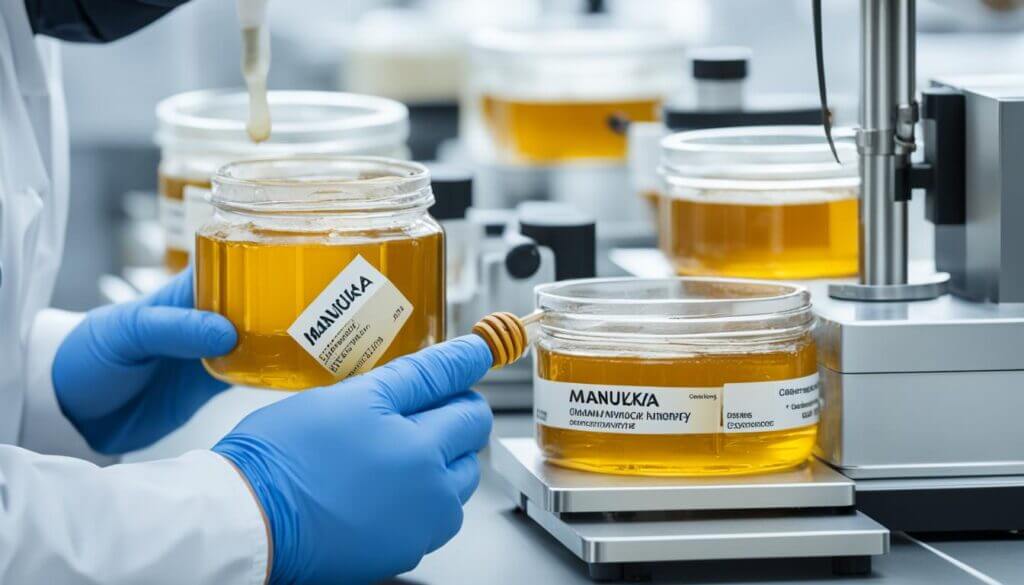
To provide clarity and maintain standards within the industry, the Unique Manuka Factor Honey Association (UMFHA) has developed a set of benchmarks that Manuka honey must meet to receive certification. This system grades honey based on the concentration of key compounds, such as methylglyoxal, which is crucial to the honey’s unique properties.
- The UMF™ grading system is used internationally to appraise the natural markers found in Manuka honey.
- UMF-licensed producers must meet rigorous standards, including regular audits and sampling to maintain certification.
- Only UMF™ certified products carry a label that verifies the presence of characteristic Manuka honey compounds.
Another important certification is the Mānuka Originz trademark, which guarantees that the honey is New Zealand-sourced, adheres to quality standards, and passes independent tests.
Regulatory oversight doesn’t just end with certification. Government bodies like the New Zealand Ministry for Primary Industries (MPI) have Manuka honey standards that producers must meet before export. MPI’s science-based definition provides a precise and measurable set of five attributes (four chemical markers from nectar and one DNA marker from Manuka pollen) that identify New Zealand Manuka honey. These regulations are vital, not only for consumer trust but also for maintaining New Zealand’s reputation as the primary source of genuine Manuka honey.
Manuka Honey in Healthcare Settings
Within the landscape of professional healthcare settings, the advent of Manuka honey therapy protocols signifies a progressive stride towards integrative medicine. Its therapeutic properties are not only complimenting traditional medical treatments but also pioneering new approaches to patient care. This section illuminates how healthcare professionals are revolutionizing medical protocols with Manuka honey, ensuring a symbiosis between conventional medicine and natural healing modalities.
Medical practitioners are endorsing the use of Manuka honey in various clinical scenarios, ranging from its application as a potent topical agent in wound management to serving as a wellness supplement in healthcare facilities. Their experiences have catalyzed the establishment of Manuka honey as a significant adjunct in healing protocols. The convergence of this natural substance with evidence-based medicine is leading to a holistic approach in treatment and recovery, enhancing patient outcomes while reducing reliance on pharmaceutical interventions.
- Topical application for wound care and burns, leveraging its antibacterial and anti-inflammatory properties.
- Adjunctive therapy for digestive health issues, capitalizing on its prebiotic benefits.
- Wellness supplement within clinical settings to promote overall health and wellbeing.
Healthcare providers are developing integrated treatment plans that include Manuka honey, attributing to its multifaceted role within the health sector. As integrative medicine flourishes, Manuka honey’s place within professional healthcare frameworks is solidifying, fostering an era where nature and science exist in unison for the betterment of patient health.
Conclusion
The journey through the versatile world of Manuka honey has illuminated its tremendous potential within the realm of natural healthcare. As we have explored the various applications of this powerful nectar—from its unparalleled wound healing capabilities to its expanding role in dietary supplements—we have witnessed how Manuka honey stands at the confluence of age-old wisdom and cutting-edge science.

At the forefront of holistic health practices, Manuka honey has not only provided an alternative to conventional medicine but has also brought to light the importance of sustainable health practices. Its efficacy in addressing an array of health concerns with minimal side effects spotlights a future where preventative and complementary health modalities are as integral as traditional treatments.
Reflecting on the future of natural healthcare, one cannot overlook the potential of Manuka honey. Its unique properties, synergy with a holistic approach to wellness, and the conscious pursuit of sustainable health solutions, carve a path towards a harmonious balance between ourselves and the natural environment.
- Greater emphasis on integrative medicine approaches
- Increased consumer demand for products like Manuka honey with multifaceted health benefits
- Research and development into new applications of Manuka honey in medical treatments
- Expansion of sustainable beekeeping practices to support the health of bee populations
In conclusion, as we step into a world prioritizing overall well-being, Manuka honey’s journey from the blossoms of the New Zealand’s Manuka bush to a staple in the global health community is a testament to the unyielding power of nature and the innovative spirit of human healthcare discovery. The essence of Manuka lies not just in its ability to heal, but to also bridge the gap between traditional remedies and contemporary health strategies for a healthier tomorrow.
References
In the pursuit of a thorough and insightful discussion on the role of Manuka honey in modern healthcare, this article has drawn upon a variety of academic sources, scientific studies, and credible references. The depth of information presented here reflects a commitment to evidence-based research ensuring that the content provided is not only informative but also trustworthy. The references cited throughout offer readers a clear understanding of the multifaceted benefits and applications of Manuka honey, as indicated by the latest findings in health science and integrative medical practices.
The UMF Honey Association has contributed significantly to our understanding of the Unique Manuka Factor, highlighting the bioactive properties that make Manuka honey a standout in the realm of natural remedies. Contributions from scholarly articles in health and wellness journals have further underscored the potent antimicrobial and anti-inflammatory actions of this unique product. Moreover, the clinical evidence showcasing its impact on wound healing and digestive health is grounded in case studies and empirical research, illuminating the real-world applications and benefits of Manuka honey.
This collection of sources aims to give credence to the content and serve as a springboard for those interested in delving deeper into the topic. It is a testament to the robustness of the research that anchors our understanding of Manuka honey’s contribution to the future of natural healthcare. Such diligence in source selection not only reinforces the article’s quality but also provides an expansive resource for readers, fostering an informed and health-conscious community.
